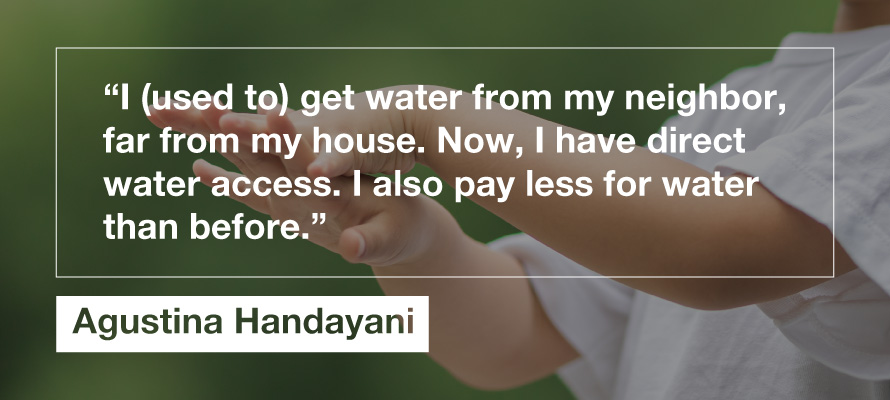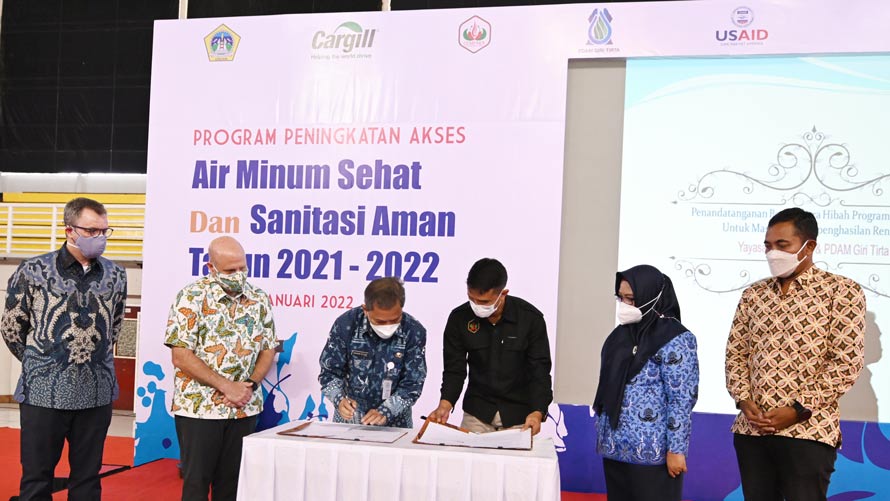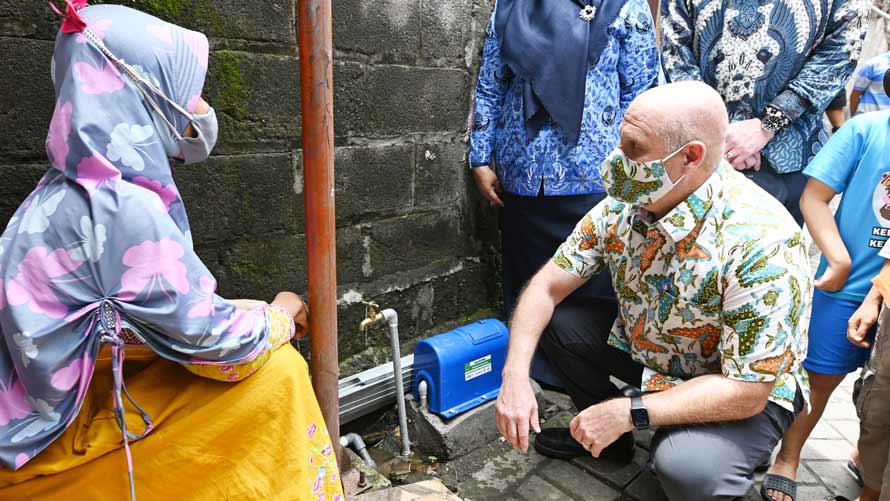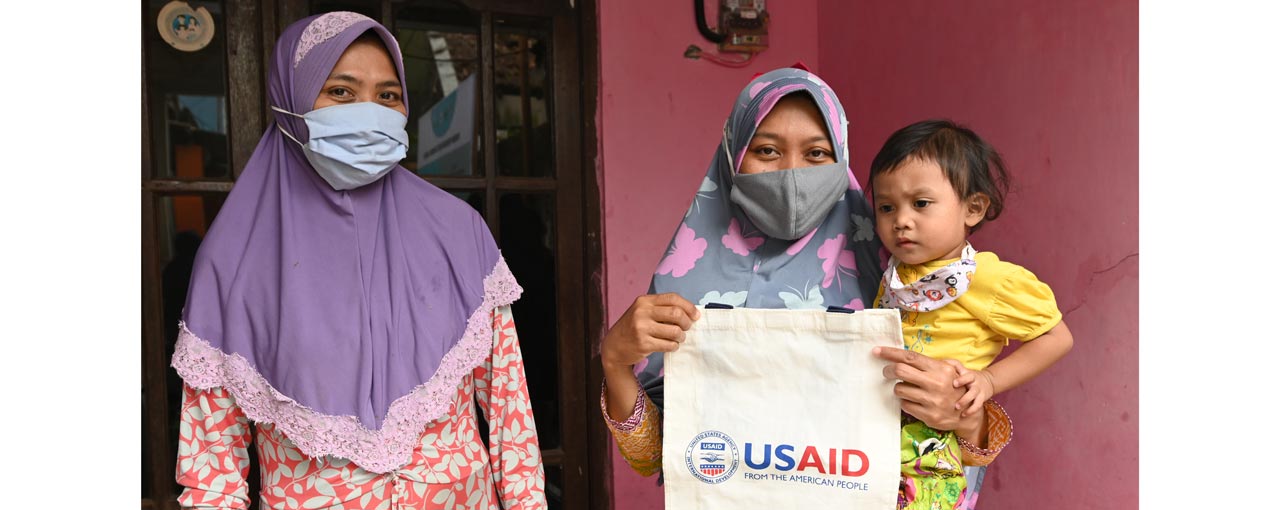Accelerating access to water and sanitation in Indonesia
Access to water, sanitation and hygiene (WASH) in Indonesia is as complex as it is critical because most Indonesians do not have the one thing that effective WASH needs - access to clean tap water. Many use river water, which exposes them to disease-causing bacteria.
Lack of access to clean water, in turn, contributes to diarrhea incidence, malnutrition and more significantly, stunting . Stunting, which effects more than one in four children in Indonesia, refers to impaired growth and development that children experience from poor nutrition and repeated infection.
By innovating and implementing sustainable solutions that preserve our lands, conserve water sources, and support farming resiliency, we can help people and communities thrive in the long term. Cargill is championing responsible land and water use and innovating and implementing sustainable solutions that conserve water sources. Towards responsible water use, Cargill is working across our supply chain to develop and accelerate agricultural solutions that protect and enhance water resources.
Acknowledging the scale of Indonesia’s WASH challenge, Cargill in Indonesia embarked on two programs. The first saw Cargill partner with the USAID-funded five-year Indonesia Urban Water, Sanitation and Hygiene Penyehatan Lingkungan untuk Semua (IUWASH PLUS) initiative, and the second advanced Cargill’s global partnership with humanitarian agency CARE USA, in supporting WASH in communities near Cargill’s business in Indonesia.
The foremost priority was helping Indonesia’s communities have regular and reliable access to clean water. “The project is working with the local government to provide greater access to safe drinking water. We help households to get a new connection from the water utilities in the regencies of Bogor and Gresik. They benefit from safer drinking water, a lower water connection fee and the lowest water tariffs,” explains an official from the USAID IUWASH PLUS Project.
Agustina Handayani, one of the program beneficiaries in Gresik district, says that access to tap water is no longer a challenge for her.
 Locals have also been provided septic tanks and these are connected to a wastewater operator for regular desludging.
Locals have also been provided septic tanks and these are connected to a wastewater operator for regular desludging.
But infrastructure alone is only half the battle won; a preliminary assessment conducted by CARE Indonesia identified the need for behaviour change communication in the local communities to create awareness about WASH, and specifically handwashing, to reduce stunting. This has led CARE to devise a strategy that places children at the centre of their outreach, in the regencies of Serang and Bone.
“In practical sessions, we ask the children to show us how they practice handwashing. We started competitions within schools, and among groups of schools on the theme of handwashing. Every student is asked to create and practice their own handwashing dance. Schools came out with multiple choreographed routines to celebrate Global Handwashing Day (15 October) every year, and the dances were uploaded on the school’s internal webpages and social media," explains a CARE official.

However, direct intervention is just one part of taking on Indonesia’s formidable WASH challenge. Having seen the impact of the program approach, the local government is replicating CARE and Cargill’s WASH practices in other schools and communities. In the regency of Serang, for example, the local government has allocated budgets to these WASH activities.
In just four years, the efforts of IUWASH PLUS in partnership with Cargill have brought about a significant change.
At the citizen level
- 1400+ people receive improved water services from new connections provided by partner Perusahaan Daerah Air Minum (PDAM), a public sector water company
- 1,200+ poor and vulnerable people have gained access to safely managed sanitation services
At the student level
- 10 toilet facilities constructed at Serang and Bone schools, benefiting 1,404 children directly (680 girls) and 5,616 family members indirectly (2,720 women and girls) through the promotion of healthy behaviors
- 19.2 percent decline in the number of students reporting absenteeism due to diarrhea
School WASH outreach
- The project created and trained a WASH and nutrition committee at each school, comprising 62 members (of which 29 are women), including parents, teachers and school principals
- CARE Cargill partnership team provided additional training to 55 representatives (30 of whom were women) from beneficiary schools in Serang and Bone on operating and maintaining sanitation facilities.
- Additionally, 76 students (49 of whom were girls) from the four replication schools in Serang were trained in maintaining the toilets that were provided by the government
Together, these numbers reinforce the Government of Indonesia’s target to meet its National Medium Term Development Plan 2020-2024 target - 100 percent access to improved water, including 15 percent with access to safely managed water, and 90 percent with access to improved sanitation, including 15 percent safely managed sanitation.


